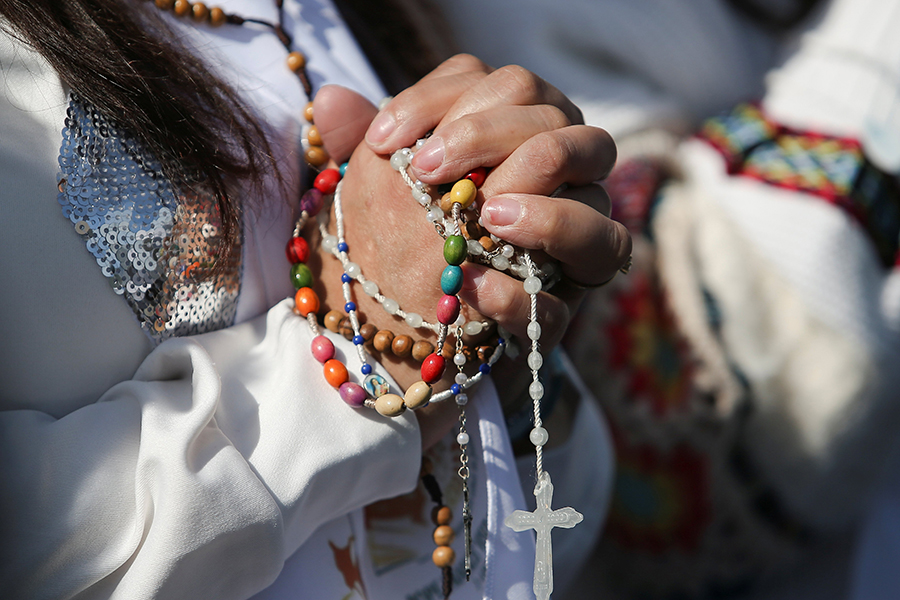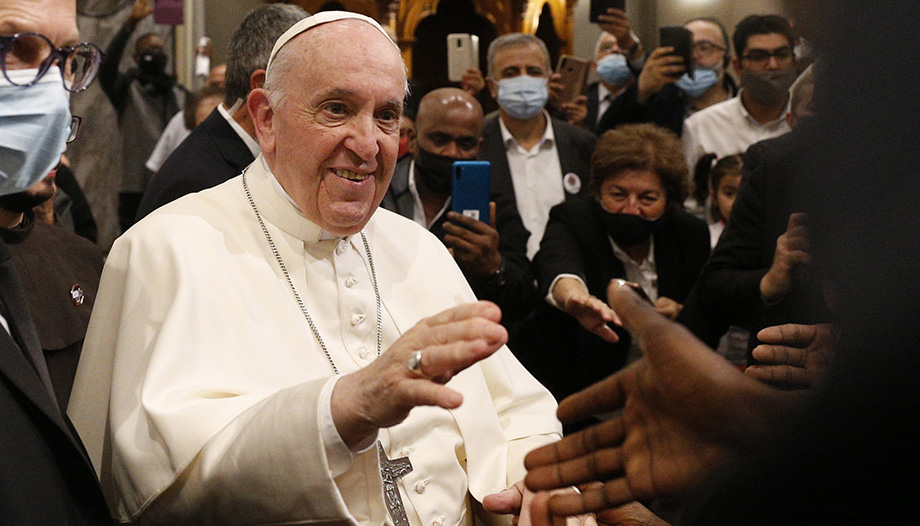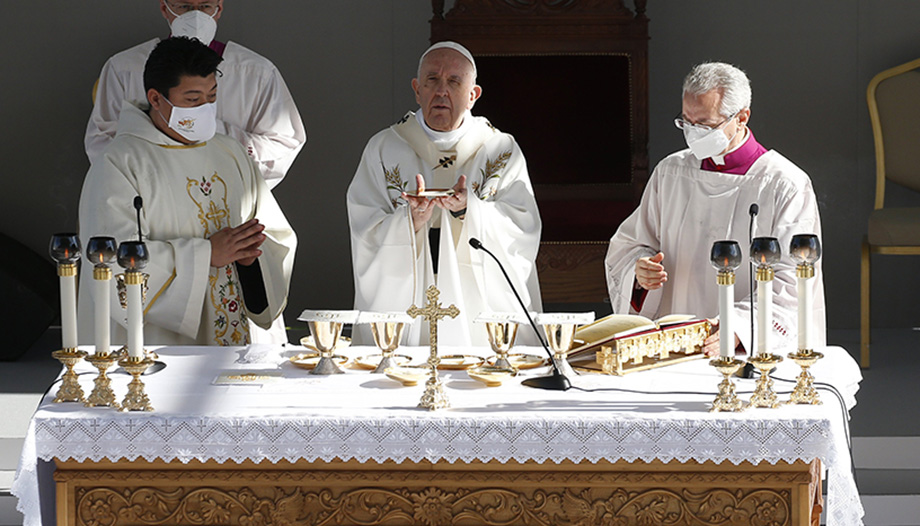The meeting with the Orthodox Archbishop of Cyprus, His Beatitude Chrysostomos II, and with the Holy Synod in the Orthodox Cathedral; the Holy Mass at the GSP Stadium in Nicosia, and the ecumenical prayer with migrants, have marked the agenda of Pope Francis in his Friday stay in the Cypriot capital.
In his homily at Mass in memory of St. Francis Xavier, the Pope encouraged the need to be "luminous Christians" who "bring the light received from Christ to illuminate the night that often surrounds us". The starting point was the Gospel of St. Matthew, which speaks of the healing of the blind men who go to Jesus, together bring him their sufferings and joyfully announce their healing. They do so because "they perceive that, in the darkness of history, he is the light that illuminates the world".
"Son of David, have mercy on us!" The two blind men in the Gospel," said the Holy Father, "trust" in Jesus and follow him in search of light for their eyes. And they do so because "they perceive that, in the darkness of history, he is the light that illuminates the nights of the heart and of the world, that defeats darkness and overcomes all blindness".
Blindness of the heart: turning to Jesus
"We too, like the two blind men, have blindness of heart. We too, like the two blind men, are travelers often immersed in the darkness of life. The first thing to do is to turn to Jesus, as he himself said: 'Come to me, all who are weary and burdened, and I will give you rest' (Mt 11:28). Who among us is not in some way weary and burdened?" the Holy Father asked. "But we resist going to Jesus; many times we prefer to remain closed in on ourselves, to be alone with our obscurities, to pity ourselves, accepting the bad company of sadness. Jesus is the doctor, He alone, the true light that enlightens every man (cf. Jn 1:9), gives us light, warmth and love in abundance. He alone frees the heart from evil".
The "first step" indicated by the Pope was, therefore, "to go to Jesus": to give him the possibility of healing our hearts. If everyone thinks of himself, blindness cannot be cured, he added. The "second step" is to bring "together" our wounds to Jesus. "In the face of every personal darkness and the challenges we face in the Church and in society," Francis pointed out, we are called "to renew fraternity," since, "if we remain divided among ourselves, if each one thinks only of himself or his group, if we do not come together, if we do not dialogue, if we do not walk together, we will not be able to fully cure blindness."
It is the "eloquent sign of the Christian life, the distinctive feature of the ecclesial spirit," the Holy Father stressed, which is "to think, speak and act as a 'we', leaving behind the individualism and the pretension of self-sufficiency that sicken the heart."
"Turn on lights of hope"
Although Jesus had recommended to the blind men, after healing them, not to say anything to anyone, they, however, did the opposite. It was not to "disobey the Lord," but simply because they "failed to contain the enthusiasm" of the encounter and their healing.
Hence the last step indicated by the Pope was to "proclaim the Gospel with joy," the distinctive sign of the Christian. "The joy of the Gospel, which is irrepressible, fills the heart and the whole life of those who encounter Jesus (Evangelii gaudium, 1), frees from the risk of an intimate, distant and complaining faith, and introduces into the dynamism of witness." Living the liberating proclamation of the Gospel with joy, Francis assured. "It is not proselytism, but witness; it is not moralism that judges, but mercy that embraces; it is not external worship, but lived love."

This was his appeal at the GSP Stadium in Nicosia: "We need enlightened Christians, but above all luminous ones, who touch with tenderness the blindness of their brothers and sisters, who with gestures and words of consolation light lights of hope in the darkness; Christians who sow shoots of the Gospel in the arid fields of daily life, who bring caresses to the loneliness of suffering and poverty".
Renewing trust in Jesus, who "hears the cry of our blindness" and who "wants to touch our eyes and our heart," "draw us into the light, make us be reborn and reanimate us interiorly" was the Pope's final recommendation, who invoked, at the end of his homily, "Come, Lord Jesus!"
"Pearl of history and faith."
Before the Holy Mass at the GSP Stadium, early in the morning, Pope Francis went to greet the Orthodox Archbishop of Cyprus, His Beatitude Chrysostomos II, and the meeting with the Holy Synod in the Orthodox Cathedral. During his courtesy visit, the Catholic Pontiff signed in the Book of Honor of the Orthodox Archbishopric of Cyprus, with the following text, which highlighted the path of dialogue to move forward together:
"Pilgrim to Cyprus, pearl of history and of faith, I invoke from God humility and courage to walk together towards full unity and to give to the world, following the example of the Apostles, a fraternal message of consolation and a living witness of hope.
Your Beatitude, thank you for speaking of Mother Church among the people. This is the path that unites us as pastors. Let us go forward together on this path. And thank you very much for speaking of dialogue. We must always advance along the path of dialogue, a laborious, patient and sure path, a path of courage. "Parresia and patience" (in Greek)".
"Common apostolic origin"
Later, in his address to the Holy Synod of Orthodox Bishops, Pope Francis began by stressing that "we have a common apostolic origin: Paul crossed Cyprus and then came to Rome. We therefore descend from the same apostolic ardor and are united by a single path: that of the Gospel. I am pleased to see that we continue to walk in the same direction, in search of ever greater fraternity and full unity".
"In this piece of the Holy Land that spreads the grace of the Holy Places in the Mediterranean, the memory of so many biblical pages and figures comes naturally". The Pope reflected once again on 'Joseph, whom the Apostles called Barnabas' (Acts 4:36): this is how he is presented in the Acts of the Apostles".
"The path of personal encounter"
"Barnabas, son of consolation, exhorts us his brothers to undertake the same mission of proclaiming the Gospel to men, inviting us to understand that the proclamation cannot be based on general exhortations, on the repetition of precepts and norms to be observed, as has often been done," the Holy Father said.
"It is necessary to follow the path of personal encounter, to pay attention to the questions of the people, to their existential needs. To be children of consolation, before saying anything, it is necessary to listen, to allow oneself to be questioned, to discover the other, to share: because the Gospel is transmitted through communion".
Synodal dimension, with the Orthodox
"This is what we, as Catholics, wish to live in the coming years, rediscovering the synodal dimension, constitutive of the being of the Church. And in this we feel the need to walk more intensely with you, dear brothers, who through the experience of your synodality can truly be of great help to us".
"Thank you for your fraternal collaboration, which is also manifested in the active participation in the International Joint Commission for Theological Dialogue between the Catholic Church and the Orthodox Church," he added.
Tomorrow, already in the Greek capital, the Pontiff will visit His Beatitude Ieronymos II, Archbishop of Athens and of all Greece, at the Orthodox Archbishopric of Greece, where a meeting will take place in the Throne Hall of the Archbishopric.









